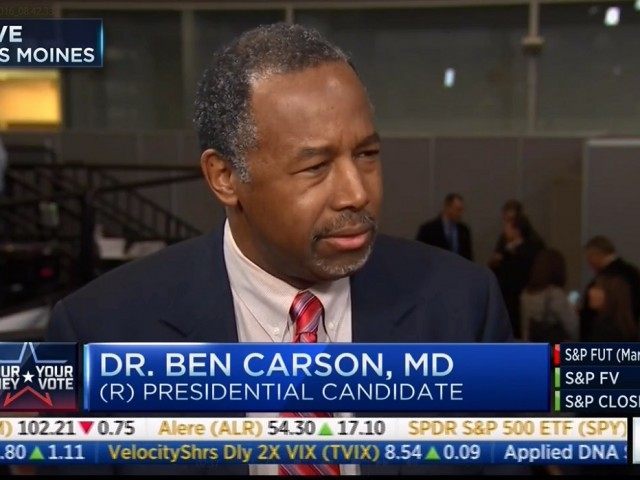Monday on CNBC’s “Squawk Box,” Republican presidential hopeful Ben Carson discussed some of the elements of his economic plan with network co-host Larry Kudlow.
Kudlow lamented the lack of economic discussion in the last debate and pointed out the lagging recovery of the economy from the 2008 collapse and what Carson thought he could do to turn things around and get the country back on track.
Partial transcript as follow:
KUDLOW: All right, you’ve got some on. So, back to policy substance. One of my disappointments about the last debate was there was virtually no discussion of the economy.
CARSON: Exactly.
KUDLOW: Which in the best scientific terms I can put it, stinks right now. The fourth quarter was 0.7 percent. This is the worst recovery since World War II. It’s not just Obama. It’s actually about 15 years or less than 2 percent economic growth.
CARSON: It has. Here is the thing that people are not paying attention to. This generation is the first one in the history of America not expected to do better than their parents. And that’s the beginning of a trend. And some people say it’s the new normal. But there is nothing normal about it.
And we shouldn’t accept it. It’s because we have taken the most powerful economic engine the world has ever known and we have wrapped it with a gazillion regulations, 81,000 pages of new regulations just last year.
The cost of regulations, almost $2 trillion. If you break that down per family, $24,000 per family of four, which happens also to be the poverty level for a family of four.
So we talk about fighting poverty. Why don’t we fight it by getting rid of the unnecessary regulations? These things cost an incredible amount of money. It’s basically a tax, a very regressive tax, because everybody has to pay it at the same level.
People have no clue what’s going on and people come and take advantage of them and they will them things like the reason you’re not doing well is because of those rich people.
And if we take their money, everything will be fine. No. Then everybody will be poor. That doesn’t work. That’s socialism.
KUDLOW: Which is more important? Inequality or solving poverty?
CARSON: Solving poverty takes care of inequality.
KUDLOW: That is a revelation. I mean, you don’t just hear that much, but a lot of distinguished people agree with you. And I guess I want to know, what would a President Carson do in the first 90, 120 days? Where would you go?
CARSON: One of the things that I think is very important is to begin to give people hope once again. And I believe that — and this is a no-brainer — we have the highest corporate tax rate in the developed world. I would try to establish a six-month tax hiatus so that we could bring back the more than $2.1 trillion overseas.
KUDLOW: No penalty. That’ll be repatriation.
CARSON: No penalty, repatriate it. The only stipulation, 10 percent of it has to be used in enterprise zones and to create jobs for people on welfare and who are unemployed and under employed.
KUDLOW: The Yellow Jack Kemp enterprise zone?
CARSON: Exactly. You want to talk about a stimulus, that would be the greatest stimulus since FDR’s New Deal and it wouldn’t cost the taxpayers a penny. But it also gets corporate America used to the idea, once again, which they used to have, of investing in the communities around them.
You’ve know, they’ve kind of lost that over the years because the government has taken it on. You know, in the ’60s, LBJ said, we the government, are going to eliminate poverty. How did that work out? You know, $19 trillion later?
Ten times more people on food stamps, more people on welfare, broken homes, poverty, crime, incarceration. The government is not supposed to do that. We ,the private sector is supposed to do that and the government can help facilitate it.
KUDLOW: So, you also have a pretty aggressive business tax cut besides the repatriation. Remind me, 15 percent unemployment tax or?
CARSON: Well, 14.9 percent.
KUDLOW: Just happens to be .9. No rounding.
CARSON: Right.
KUDLOW: No rounding out.
CARSON: Well no. I mean, — no. We don’t round it out. We worked the numbers out very precisely. And not only that, it’s a 14.9 percent flat tax rate for everybody. Over the course of not too long a period of time, I think that rate would come down.
The reason that we put it up at 14.9, is because there are certain things that must be taken care of, you know: infrastructural things, hardening the grid, solidifying the military.
You know, right now our military spending is down around 3.4 percent; traditionally it has been at 4 percent. And that’s at at time when we’re in great danger.
That’s not to say there isn’t waste in the military. There is waste in everything. There’s 645 governmental agencies and sub-agencies. I would cut fat out of all those.
But when you begin to do things like that, you begin to apply systems like Lean Six Sigma to the governmental departments and agencies, then you get real efficiency. That’s what the people deserve.
Follow Jeff Poor on Twitter @jeff_poor

COMMENTS
Please let us know if you're having issues with commenting.